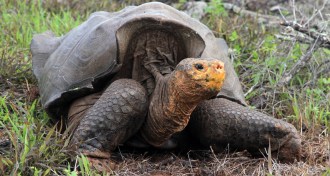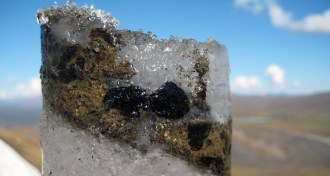All Stories
-

For Halloween, Gory Details favorites and farewell
Gory Details blogger Erika Engelhaupt left Science News earlier this year. In a farewell post and in honor of Halloween, she reminisces about some of her favorite, and scariest, posts.
-
 Neuroscience
NeuroscienceScratching releases serotonin, making you itch more
Scratching an itch releases serotonin in the brain, which can eventually make the itch sensation worse, a new study shows.
-
 Earth
EarthEarly animals couldn’t catch a breath
Low levels of oxygen may have hindered evolution of animal life hundreds of millions of years ago.
-
 Tech
TechSheath helps ‘aqua-hamster’ survive underwater
Scientists hoped a membrane invented in 1964 would let submarines pull air from seawater.
-
 Animals
AnimalsBirds large and small hop over obstacles in similar ways
Bipedal birds, from tiny quail to huge ostriches, tackled a step in a similar way, minimizing energy cost and maximizing safety.
-
 Animals
AnimalsNew frog species discovered in New York City
A new frog species lives up and down the East Coast. It was discovered when ecologists realized its ‘ribbit’ was distinct from the calls of a lookalike species.
-
 Health & Medicine
Health & MedicineMini stomachs grown in lab
Clumps of human gastric cells could help researchers study stomach diseases.
By Meghan Rosen -
 Science & Society
Science & SocietyAsteroids closer to home may get us to Mars
NASA should abandon its attempt to bring a space rock into lunar orbit and instead scrutinize ones already whizzing by Earth, one scientist argues.
-
 Life
LifeA little good news for giant tortoises in the Galapagos
The giant tortoise population on the Galapagos island of Española is on the rebound, but there are still concerns about other markers of conserving the endangered species.
-
 Microbes
MicrobesFrozen caribou feces offers look at virus evolution
Genetic material extracted from caribou poop gives hints about how viruses evolve.
-
 Science & Society
Science & SocietySewing study stitches up Broadcom prize
Holly Jackson of San Jose, Calif., zigzagged her way through three days of science, engineering and math challenges to win the top prize at the Broadcom MASTERS middle school science competition.
By Sid Perkins -
 Neuroscience
NeuroscienceBrain difference found in people with chronic fatigue
Abnormality found in the brains of a small number of people with chronic fatigue syndrome is intriguing, but needs to be confirmed with more patients.